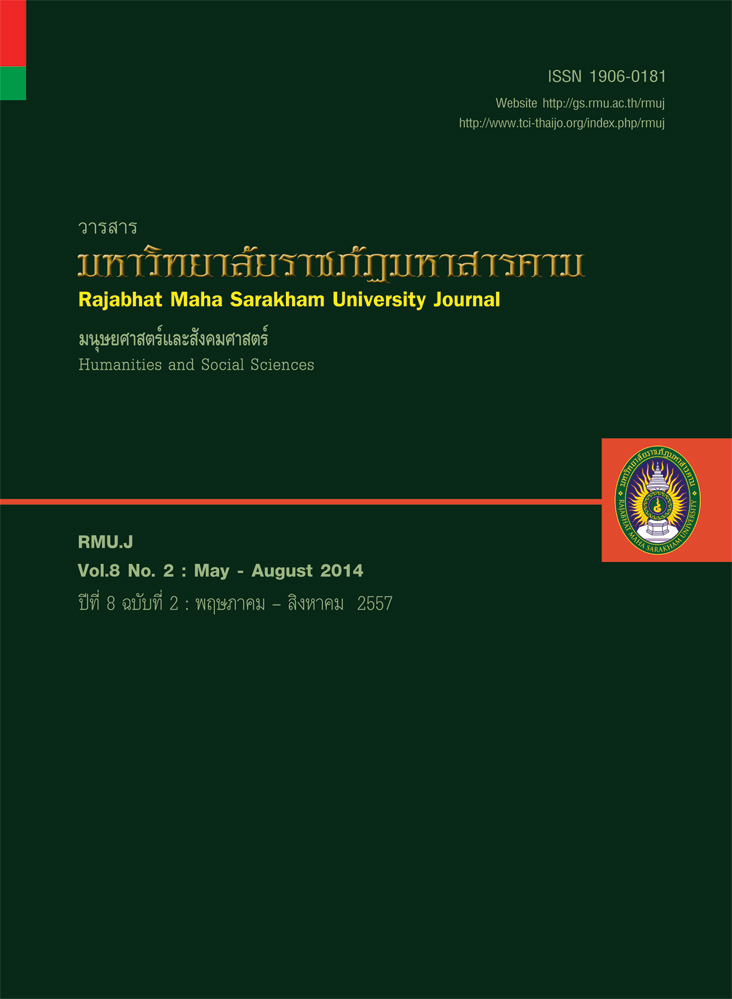การพัฒนากิจกรรมการเรียนรู้วิชาคณิตศาสตร์แบบสืบเสาะหาความรู้ เรื่อง เศษส่วนและทศนิยม ชั้นมัธยมศึกษาปีที่ 1 The Development of Mathematics Learning Activities by Using the Inquiry Approach on “Fraction and Decimals” of Grade 7th Students
Main Article Content
บทคัดย่อ
การวิจัยครั้งนี้มีวัตถุประสงค์ ประการแรก เพื่อพัฒนากิจกรรมการเรียนรู้แบบสืบเสาะหาความรู้และกิจกรรมการเรียนรู้แบบ
ปกติ เรื่องเศษส่วนและทศนิยม ชั้นมัธยมศึกษาปีที่ 1 ที่มีประสิทธิภาพตามเกณฑ์ 75/75 ประการที่สอง เพื่อศึกษาดัชนีประสิทธิผล
ของการจดั กิจกรรมการเรยี นร้แู บบสบื เสาะหาความรแู้ ละกิจกรรมการเรียนร้แู บบปกติ ประการทีส่ าม เพือ่ เปรียบเทยี บผลสมั ฤทธิท์ างการ
เรียน เรื่อง เศษส่วนและทศนิยม ชั้นมัธยมศึกษาปีที่ 1 ระหว่างการจัดกิจกรรมการเรียนรู้แบบสืบเสาะหาความรู้ กับการจัดกิจกรรม
การเรียนรู้แบบปกติ และประการที่สี่ เพื่อศึกษาความคงทนในการเรียนรู้วิชาคณิตศาสตร์ เรื่อง เศษส่วนและทศนิยม ของนักเรียนชั้น
มัธยมศึกษาปี 1 ได้รับการจัดกิจกรรมการเรียนรู้แบบสืบเสาะหาความรู้ กลุ่มตัวอย่างที่ใช้ในการวิจัยครั้งนี้เป็นนักเรียนชั้นมัธยมศึกษา
ปีที่ 1 โรงเรียนบ้านโนนเที่ยง จำนวนห้องเรียน 1 ห้อง จำนวน 22 คน และนักเรียนชั้นมัธยมศึกษาปีที่ 1 โรงเรียนนามนราษฎร์สงเคราะห์
จำนวนห้องเรียน 1 ห้อง จำนวน 24 คน ที่เรียนในภาคเรียนที่ 2 ปีการศึกษา 2555 ซึ่งได้มาโดยการสุ่มแบบกลุ่ม (Cluster random
sampling) แต่ละห้องจัดแบบคละความสามารถ เครื่องมือที่ใช้ในการวิจัยในครั้งนี้ ได้แก่ แผนการจัดการเรียนรู้แบบสืบเสาะหาความ
รู้และแผนการจัดการเรียนรู้แบบปกติ เรื่อง เศษส่วนและทศนิยม จำนวน 21 แผนแผนละ 1 ชั่วโมง รวม 21 ชั่วโมง แบบทดสอบ
วัดผลสัมฤทธิ์ทางการเรียนวิชาคณิตศาสตร์ เรื่อง เศษส่วนและทศนิยม ซึ่งเป็นแบบทดสอบชนิดเลือกตอบ 4 ตัวเลือก จำนวน 40 ข้อ
มีค่าอำนาจจำแนกรายข้อตั้งแต่ 0.28 ถึง 0.60 ค่าความเชื่อมั่นทั้งฉบับเท่ากับ 0.87 สถิติที่ใช้ในการวิเคราะห์ข้อมูล ได้แก่ ร้อยละ
ค่าเฉลี่ย ส่วนเบี่ยงเบนมาตรฐาน และการทดสอบสมมติฐานใช้ t-test (Independent samples) และ t-test (Dependent samples)
ผลการวิจัยพบว่า
1. กิจกรรมการเรียนรู้แบบสืบเสาะหาความรู้ ที่ผู้วิจัยสร้างขึ้นมีประสิทธิภาพเท่ากับ 79.16/79.20 และกิจกรรมการเรียนรู้
แบบปกติ มีประสิทธิภาพเท่ากับ 76.41/75.10 เป็นไปตามที่คาดหวังไว้คือ 75/75
2. ดัชนีประสิทธิผล (Effectivenes index : E.I) ของการจัดกิจกรรมการเรียนรู้แบบสืบเสาะหาความรู้ เท่ากับ 0.6772
และดัชนีประสิทธิผล
3. นักเรียนที่เรียนด้วยการจัดกิจกรรมการเรียนรู้แบบสืบเสาะหาความรู้ มีผลสัมฤทธิ์ทางการเรียนสูงกว่านักเรียนที่เรียน
ด้วยการจัดกิจกรรมการเรียนรู้แบบปกติ เรื่อง เศษส่วนและทศนิยม อย่างมีนัยสำคัญทางสถิติที่ระดับ .05ของการจัดกิจกรรมการเรียนรู้แบบปกติ เท่ากับ 0.6163
4. นักเรียนที่เรียนด้วยการจัดกิจกรรมการเรียนรู้แบบสืบเสาะหาความรู้ มีความคงทนในการเรียนรู้
The purposes of this study were to: 1) develop learning activity using the 7E of learning cycle approach
and the traditional learning approach about fraction and decimals of grade 7th students with efficiency value
of 75/75; 2) study effectiveness index of the 7E of learning cycle approach and the traditional learning
approach; 3) compare the students’ learning achievement in fraction and decimals of grade 7th students
between using the 7E of learning cycle approach and the traditional learning approach; and 4) to study
learning retention of Mathematics about fraction and decimals of grade 7th student using the 7E of learning
cycle approach. The research subjects consisted of a class of 22 grade 7th students studying at Ban Nontieng
School and a class of 24 grade 7th students at Namonratsongkroa School in the second semester of academic
year 2012, obtained through the cluster random sampling technique. Each classroom consisted of the students
with different ability levels. The research instruments for data collection 21 lesson plans about fraction and
decimals for the 7E of learning cycle approach and the traditional learning approach, each lesson plan was
used for an hour (21 hours in total); and a 4 multiple choice test about fraction and decimals (40 items in total)
with each item reliability ranging 0.28-0.60, and the whole test reliability of 0.87. The statistics used for data
analyses were percentage, mean, and standard deviation. Independent t-test and dependent t-test were
used for testing hypotheses.
The results were as follows:
1. This learning activity of the 7E of learning cycle approach and the traditional learning approach
had the efficiency values of 79.16/79.20, and 76.41/75.10, respectively which were higher than the required
criteria.
2. The effectiveness index of the 7E of learning cycle approach and the traditional learning approach
were 0.6772 and 0.6163, respectively.
3. The students who studied fraction and decimals by using the 7E of learning cycle approach
showed gains in learning achievement from the traditional learning approach at the .05 level of significance.
4. The students who studied the 7E of learning cycle approach showed gains in learning retention.
Article Details
1. บทความที่ลงตีพิมพ์ทุกเรื่องได้รับการตรวจทางวิชาการโดยผู้ประเมินอิสระ ผู้ทรงคุณวุฒิ (Peer Review) สาขาที่เกี่ยวข้อง อย่างน้อย 3 ท่าน ในรูปแบบ Double blind review
2. ข้อคิดเห็นใด ๆ ของบทความที่ลงตีพิมพ์ในวารสารมหาวิทยาลัยราชภัฏมหาสารคาม นี้เป็นของผู้เขียน คณะผู้จัดทำวารสารไม่จำเป็นต้องเห็นด้วย
3. กองบรรณาธิการวารสารมหาวิทยาลัยราชภัฏมหาสารคาม ไม่สงวนสิทธิ์การคัดลอกแต่ให้อ้างอิงแสดงที่มา


